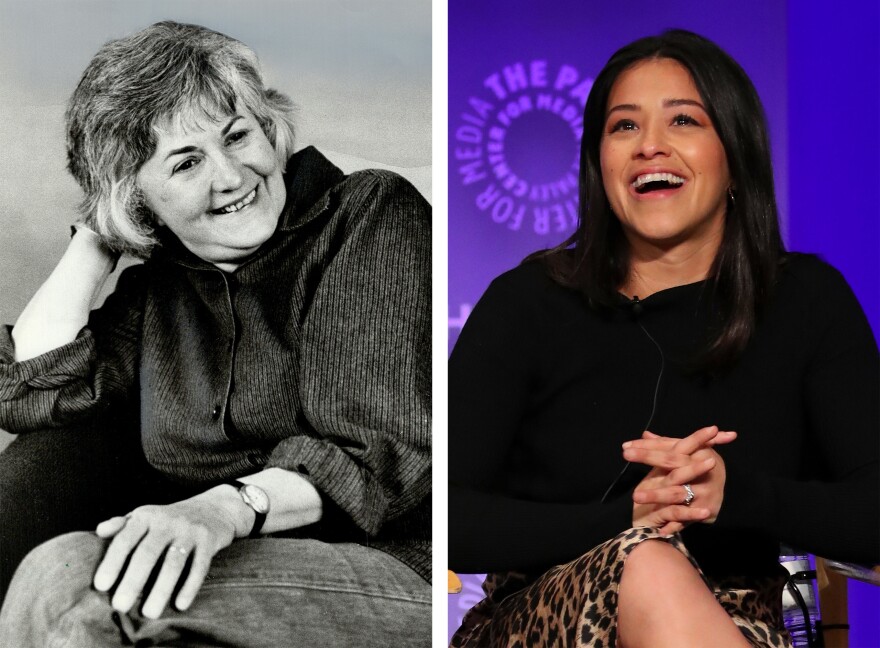As people across the United States try to envision a world without Roe v Wade, scripted TV shows have portrayed the impact of abortion on fictional characters.
Storylines that include abortion have increased a lot on TV in recent years. In 2021, ANSIRH (Advancing New Standards In Reproductive Health) tracked 47 plotlines that involved abortion over 42 shows including dramas like Hulu's Handmaid's Tale and NBC's This Is Us and comedies such as Hacks on HBO Max and Workin' Moms on Netflix. Five years ago, there were only 13 plotlines involving abortion.
"But, as any researcher will tell you, an increase in quantity doesn't necessarily mean an increase in quality," says Steph Herold, a researcher with ANSIRH.
The problem: stories about abortion often reach for the extremes rather than reality.
First, TV characters who get abortions are mostly white, wealthy and without children. "Kind of the exact opposite of the reality of who's getting abortions," she says. "Most people who have abortions are already parents. They're struggling to make ends meet. They're women of color." You can see a demographic breakdown as reported by the CDC here.
Extreme storylines often drive the abortion narrative
Second, events are exaggerated for dramatic effect. "They really tend to use abortion in particular as something coercive that happens to someone," says Herold. She points to a 2021 Law & Order episode in which a foster father forces a teen to get a medical abortion. Afterwards the teen suffers near fatal consequences from the pills. Herold finds the episode "extremely irresponsible because we know that abortion pills are very safe."
Recent shows that get a bit closer to reality, says Herold, include Love Life on HBO Max, Queens and A Million Little Things on ABC.
Herold describes a character's experience with a medical abortion in A Million Little Things as a straightforward but compassionate telling. "We actually see her take the pill, put it in her mouth. She sits on the couch. She's surrounded by pillows and blankets. The guy she had sex with actually flies over to Boston from the U.K. to be with her during her abortion," Herold explains.
Networks like to avoid controversy
Hollywood has a history of avoiding major controversies and abortion is one of them. In some cases, characters with unplanned pregnancies will consider abortion but miscarry before actually undergoing the procedure.
In 1996, Julia, a 16-year-old character on Fox' Party of Five, gets pregnant. The show's creators planned to have her get an abortion but the network wouldn't allow it. Instead, she has a miscarriage. Co-creator Amy Lippman told New York Magazine, "that was distressing to us because we thought there was real value in showing what a character in that family under those circumstances would do."
For Tanya Melendez, that's not the only problem with the show's treatment of abortion. Melendez is a doctoral student at the University of Illinois Urbana-Champaign's Department of Communication. She says Julia consults with just about every other main character on the show for advice on whether she should get an abortion. "She has these individualized scenes with all of them where they're essentially debating whether or not she should do it," she says, which "strips the agency from the woman."
While storylines that include abortion have increased dramatically over the past five years, it's not a new topic. More than two decades before Party of Five, writer, producer and director Norman Lear and actress Bea Arthur were having a similar conversation about what the 47-year-old sitcom character Maude would do if she got pregnant. In 1972, just months before Roe v Wade was passed, Maude became the first primetime TV series in which the lead character decides to get an abortion. In the two-part "Maude's Dilemma," she is conflicted over the decision but, ultimately, she and her husband decide they are too old to have a child.
Lear told the Television Academy Foundation the writers consulted with experts to inform the episodes. They wrote a character the same age as Maude who also announces she's pregnant with her fifth child. Unlike Maude, she elects to have the baby. "So we balanced it as much as we could," Lear said.
The telenovela Jane the Virgin's portrayal was 'groundbreaking'
Balancing different beliefs and feelings about abortion is done with sensitivity and humor in the American telenovela Jane The Virgin, Diana Martinez, who analyzed the episode for The Atlantic, tells NPR. Martinez is artistic director of Film Streams, an arthouse film organization in Omaha, Neb.
In the first episode, 23-year-old Jane becomes pregnant when she is accidentally, artificially inseminated. Telenovela plot twists can be "wild," laughs Martinez.
Jane's mother is a party girl who had Jane when she was 16. Jane's grandmother is a strict, devout Catholic. Martinez believes it was "groundbreaking" to include abortion in the storyline, "particularly because this is a taboo subject within Latino households. There's a political divide. There's a generational divide."
In the first episode, Jane assumes the reason she's alive is because her grandmother would have forbidden her teenage mother to have an abortion. But her grandmother admits to Jane that, in fact, she did tell her daughter to have an abortion. "But I carry that shame in my heart every day," Jane's grandmother tells her, fighting back tears.
"It's powerful because it allows for this duality to exist," says Martinez, "that people of faith can also believe in a woman's choice."
By the end of episode 2, Jane decides to give birth as a surrogate for a couple trying to have a child.
TV has the power to inform
In 2019, an NPR/PBS NewsHour/Marist Poll found that, "Three-quarters of Americans say they want to keep in place the landmark Supreme Court ruling, Roe v. Wade, that made abortion legal in the United States, but a strong majority would like to see restrictions on abortion rights."
As NPR's Domenico Montanaro reported at the time, "What the survey found is a great deal of complexity — and sometimes contradiction among Americans — that goes well beyond the talking points of the loudest voices in the debate."
Exploring complexity, nuance and multiple viewpoints isn't necessarily a hallmark of scripted TV. But, says Herold, the medium has the power to inform.
"Most people don't know about abortion laws and restrictions in their states, and television and film can really address and challenge this information and misinformation and give audiences a glimpse into who gets abortions and what that experience is really like."
Copyright 2022 NPR. To see more, visit https://www.npr.org.









